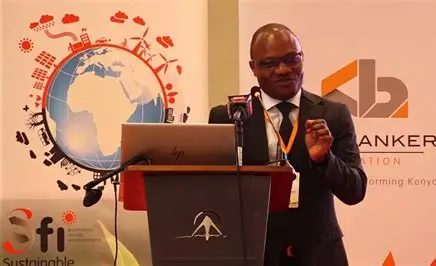
On a scorching March afternoon last year, an American aid worker was sitting on a stool in the town of Sheraro in the war-scarred Ethiopian region of Tigray, sipping traditional roasted coffee, when a red truck filled with sacks of grain came into view.
The 50-kilo bags were stamped USAID – short for the US Agency for International Development, the world’s largest donor of food assistance. The grain was supposed to help some of the millions of people in Tigray who depend on food donations to survive.
But instead of heading to its intended destination – a camp filled with starving people – the red truck was moving in the wrong direction. The USAID worker, joined by several colleagues, decided to follow it.
This red truck carrying donated food was spotted heading in the wrong direction. Aid workers followed it – and exposed a vast theft operation. The photo is from an internal presentation of a preliminary probe by aid agency USAID.
USAID officials say they soon learned that thousands of tonnes of donated grain were being diverted to commercial mills and markets throughout Ethiopia. The chance discovery shocked USAID, which announced the bare outlines of the alleged scheme in May 2023 and said it had launched an investigation. The United Nations World Food Programme – a major distributor of food aid and a key USAID partner in feeding the hungry in Ethiopia and globally – said it, too, would investigate.
The aid giants suspended food aid distribution throughout Ethiopia as they examined the matter, disrupting supplies to millions of hungry people for at least five months. They have yet to release findings or name suspects.
Yet humanitarian-aid workers and US officials believe the caper marked one of the biggest thefts and diversions of food aid ever documented. While the total loss may never be known, a Tigrayan official has said that more than 7,000 tonnes of wheat were stolen – enough grain to feed more than 450,000 people for a month.
Cindy McCain, the head of the WFP, said in a public statement at the time that the UN body had “zero tolerance for theft or diversion.” But our investigation found that the WFP was aware food aid was being stolen in Ethiopia for several years, and repeatedly failed to act. Aid was being funnelled to the Ethiopian and Tigrayan armies as well as to the black market, according to an internal USAID slide presentation viewed by Reuters.
The WFP was warned by its own staff and other aid organisations as early as 2021 about food diversion occurring throughout the country, four UN workers and diplomats told Reuters. They said the WFP chose to look the other way amid the civil war then tearing the country apart: It feared the Ethiopian government might retaliate by limiting the number of trucks delivering aid to embattled Tigray.
The WFP told Reuters it lacked sufficient details to comment on those incidents of food diversion. An official with the Ethiopian Disaster Risk Management Commission, the country’s relief agency, denied the government would have limited the flow of aid into Tigray.
USAID employees reported finding mills in Ethiopia full of stolen food aid, including these scenes shown in an internal presentation of the aid agency’s preliminary investigation.
Some US officials privately accuse the UN food body of being untrustworthy. An internal WFP investigative report cites a May 2023 cable from Washington’s top US diplomat in Ethiopia at the time: “The scale and depth of diversion” in areas where the WFP managed food relief “calls into question WFP’s ability to be a faithful and principled” partner for distributing food in Ethiopia.
USAID employees discovered that donated food was being diverted across the country in a “systematic” way and on an “industrial level,” according to the presentation of the agency’s preliminary investigation, which covers the period March to May 2023. The Ethiopian military was regularly redirecting donor-funded wheat to private mills to be turned into flour for its soldiers, the presentation said. And “predatory racketeers” were manipulating the hungry into selling them their rations.
In its internal report, the WFP acknowledges aid was diverted to markets and mills on a large scale after it had delivered the food to its local partners for distribution to the needy. But it found no evidence that the organization itself was responsible. Instead, the report points to the civilians who were the intended recipients of the aid. The “diversion was primarily driven by beneficiaries” in Ethiopia, who sold some of their food rations, the January 2024 report says.
The food theft in Ethiopia shows how a global system designed to tackle hunger and prevent famine – comprised of UN agencies, non-governmental humanitarian groups and donor countries led by the US – can be subverted by corruption, lax administrative controls and local government misrule. That system is already under enormous strain.
Last year, nearly 282 million people in 59 countries and territories faced high levels of acute food insecurity. They included more than 36 million children under five years old who were acutely malnourished.
“Stopping the distribution of food was a disaster,” said Abune Tesfaselassie Medhin, the bishop of the Catholic diocese of Adigrat, a city in Tigray. “People were dying, the health of children and elders worsened … It is a sin.”
This story, the first comprehensive account of the aid theft and its consequences for Ethiopians, is based on previously unreported findings of the WFP investigation and USAID’s preliminary probe. Reporters also interviewed more than 20 people familiar with the case, including US, UN and Ethiopian officials, diplomats and aid workers.
Who masterminded the food diversion scheme remains a mystery. USAID and the WFP are continuing to investigate. In response to questions, the WFP said it takes “measures to investigate and prevent” the misuse of food assistance when it “detects the illegal sale of large quantities of humanitarian supplies.”
Ethiopian and Tigrayan officials denied their militaries received diverted food aid. The Tigrayan government said aid recipients often “contributed” to what it called its “citizen army.”
One outcome of the scam is clear: The scandal has left a rift between USAID and the WFP, the two giant humanitarian organisations that partner to provide life-saving food aid to millions of the world’s hungriest. USAID plans to phase out the WFP as its food distributor in Tigray and the rest of northern Ethiopia over the next nine months or so, turning to other aid groups instead, USAID officials told Reuters.
Both USAID and the WFP said they remain valued partners. USAID said its decision to use other aid groups in northern Ethiopia was based on “cost efficiencies” and “lower projected needs.”
“The diversion of food was a disgrace,” Andrew Mitchell, who served as Britain’s minister for Africa until July, told Reuters. “You can’t expect American taxpayers to go to the aid of starving people if those same taxpayers are then informed that the money has been stolen by the soldiery.”
The WFP continues to face food diversion and other crimes in Ethiopia, an internal document shows. The WFP’s “Monthly Incident Report” on Ethiopia for August reported 39 cases, including allegations of aid diversion, theft, the extortion of beneficiaries and the discovery of donated food for sale in local markets. WFP told Reuters these were “minor incidents” and didn’t indicate “large-scale diversion.”
US Senator James E. Risch, the top Republican on the Senate Committee on Foreign Relations, called the diversion of food aid “intolerable.”
“This system denied millions of people access to lifesaving aid while enabling corrupt officials and armed combatants to serve their own objectives,” he told Reuters. “Those responsible for diversion must be held accountable.”
Ethiopia drew world attention as it struggled with famine in the 1970s and 1980s. Hundreds of thousands died as a result of starvation caused by drought and conflict. The hunger crisis was publicised by “Live Aid,” a trans-Atlantic concert in 1985 that featured major rock stars and raised an estimated $100 million.
In the past three decades, Ethiopia made remarkable progress, especially in agriculture. Droughts and poor harvests no longer resulted in famines. But the country hasn’t been immune to what’s now the main cause of famine globally: war.
Ethiopia waged a brutal border war with neighbouring Eritrea from 1998 to 2000. The countries signed a peace deal in 2018 that later earned Ethiopia’s Prime Minister Abiy Ahmed, the Nobel Peace Prize. Then, in November 2020, Abiy went to war with the Tigray People’s Liberation Front, which had once ruled Ethiopia and still controls the Tigray region. Eritrea sent troops to back Abiy and, with the Ethiopian army, occupied most of Tigray.
The war, which ended in November 2022, killed tens of thousands and left millions hungry, making it one of the world’s deadliest conflicts in recent times. Although the fighting is over, hunger continues, with millions of Ethiopians still requiring food assistance, according to the UN.
The aid diversion uncovered in Tigray last year wasn’t the first such episode in Ethiopia. Theft and redirection of food and other foreign assistance have been occurring for several years, diplomats and aid officials say.
Just months after the war in Tigray broke out in November 2020, aid was being stolen.
In March 2021, two senior aid workers said they travelled to Adigrat, in Tigray, where they witnessed a distribution of food aid by Ethiopia’s Joint Emergency Operation Programme, a food-assistance programme funded by USAID. Instead of seeing people receiving the food, they saw sacks of USAID-donated grain being loaded into vehicles and donkey carts.
The vehicles had Eritrean license plates and were apparently headed to Eritrea, one of the aid workers said. The other worker reported the incident to WFP and USAID officials. The Eritrean government denied its military received diverted food aid. “Why would we … steal paltry items donated to others?” a government official said in response to questions.
“This system denied millions of people access to lifesaving aid while enabling corrupt officials and armed combatants to serve their own objectives.”
Also in 2021, a senior UN official saw multiple trucks with Eritrean licence plates being loaded by uniformed Eritrean soldiers with what he believed was WFP food aid leaving Ethiopia and crossing into Eritrea. The official said he reported what he observed to both the WFP and USAID. A diplomat corroborated that the official shared the information with the two aid organisations.
- A Reuters report








